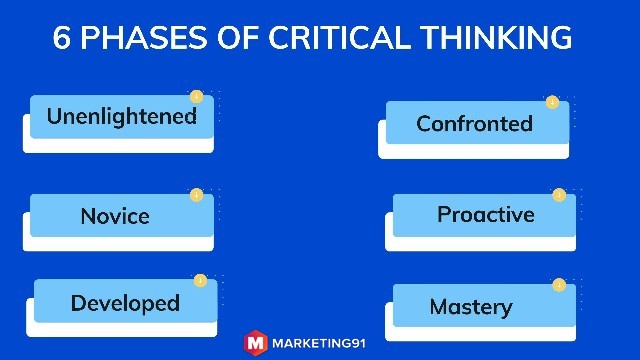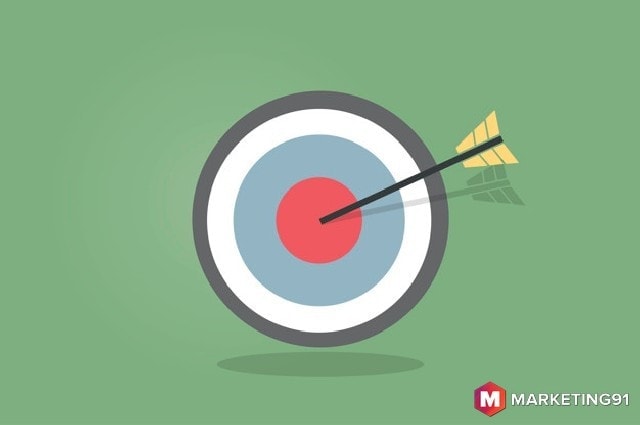Critical thinking is a term we generally come across. If we don’t, then we are not in the company of smart people. Often you’ll have heard someone says that their friend or colleague is excellent at critical thinking. But what does this mean?
So, in simple terms, Critical Thinking can be understood as having the aptitude to think better by improving skills of thinking. It revolves around the concepts of analyzing (considering and reflecting) and synthesizing (piecing together) for the things they are currently learning and have learned.
Although critical thinking is an essential mental discipline, there isn’t one singular definition that applies to it. Critical thinking refers to the ways through which we examine the world around us with care and precision.
It is the process where we can focus on every side of the picture, analyze different perspectives and derive a logical conclusion.
But what are the crucial characteristics of critical thinking? We will go through those in our next section but before that, let’s try to understand different phases of Critical Thinking.
Table of Contents
6 Phases of Critical Thinking
There are 6 phases involved in critical thinking-
Phase 1) Unenlightened Thinking
People with such kind of critical thinking do not consciously know that some key problems exist in their current thinking pattern.
Phase 2) Confronted Thinking
People with this kind of thinking know that some problems exist in their current thinking pattern.
Phase 3) Novice Thinking
Such kinds of critical thinking enable people to initiate improvements in their thinking patterns, but they do not follow a consistent improvement pattern.
Phase 4) Proactive Thinking
People with such kind of critical thinking know the significance of regular practice for improving their thinking patterns.
Phase 5) Developed Thinking
People with Developed Critical Thinking start advancing as per their regular practice for improving thinking patterns.
Phase 6) Mastery Thinking
With Mastery Critical Thinking, people turn more adept, insightful and skilled in a manner that they have the right kind of analytical, reflective and evaluative thinking.
Now, after being aware of the different phases of critical thinking, let us have a look upon 21 key characteristics of Critical Thinking-
21 Characteristics of Critical Thinking
1. Observation
This is perhaps the most crucial part of critical thinking. Without careful consideration, it is impossible to understand every aspect of a problem or a situation. Observation is the best way of learning about the world, its limitation, and laws.
We have to employ all our senses when observing the situation that we are trying to asses. The more we use our observation skills, the more experienced we become. Experience is what primarily builds our potential to observe the minutest details and analyze them critically.
2. Inquisitiveness
The quality of curiosity goes a long way in critical thinking. If you want to think critically, you must not settle for the facts. You have to raise questions and challenge them constantly. It helps learn new things and discover new sides to your matter.
You must be interested in the things happening around you. Every phenomenon should spark your spirit of inquiry and raise doubts and queries in your mind. If you are inquisitive, you can gather much more information about a subject than most people. It is crucial for a critical thinker.
3. Objectivity
As a critical thinker, you have to approach a situation after you free yourself from your emotions. If you employ your emotional mind to evaluate a problem, there are many solutions that you will be unable to see. For instance, if a problem is making you angry, you should lose your temper and think coolly.
It will make sure that you and not your anger is judging the situation. Also, you will be able to see various sides to the problem which were invisible before. It will help you arrive at solutions faster.
4. Introspection
Introspection refers to the process through which we can analyze our thoughts. It is indispensable in critical thinking. Meditation allows you to question yourself and your point of view. It determines how engaged you become in observing the problem.
Introspection significantly increases our attentiveness. We can look into our emotions and our mental state through self-reflection. It is not an easy process and might require some severe meditation into your values.
5. Analytical Thinking
We have already mentioned analytical thinking numerous times till now. But what exactly should we do when we’re analyzing a problem? Analysis refers to the process of approaching all sides of an issue. It includes assessing all the decisions and the consequences associated with them.
Analytical thinking is essential to understand the best course of action. A thorough investigation into things helps us break the problem down to bits and understand which solution will work.
6. Identifying Bias
No one is free from bias and pre-formed opinions. This negatively affects critical thinking and comes in the way of finding answers. Thus, when thinking critically, you must challenge your attitude towards a problem.
This helps in giving a better solution to any problem that you face. You will understand that soon that the information you have received is not complete and could be improved. For instance, any business transaction or event, when seen in an unbiased light, is analyzed much better.
7. Determining Relevance
You cannot use all the data and information provided to you. When you receive several reports, you might find it challenging to sift through all of them with efficiency. To do this, you have to differentiate between relevant and irrelevant information.
A large amount of unfiltered information is not vital for your work. Instead, it could hamper and misguide you. A critical thinker should be able to see through unnecessary details easily. This skill might take some time to build up, but it pays off!
8. Inference
This is another highly important characteristic of a critical thinker. As someone who is supposed to analyze data, you will receive a large amount of information in a disorganized fashion. This will be seen often since most data is collected in a hurry.
You have to organize and analyze all the information that you receive. You need to offer correct logical conclusions and make use of proper inference. This way, you will be able to discover the various types of results which will ensue from different actions.
9. Compassion and Empathy
We know we have asked you to put your emotions aside when making important decisions. But compassion and empathy are two virtues that can significantly help your decision-making skills. When making a decision, we are led by at least some emotion. It is best if this feeling is that of compassion.
We aren’t robots. We have to think of the well being and betterment of the people around us. In most decisions that we take, we have to remember that we will be impacting other men and women. This is why empathy plays an important role.
10. Being Humble
Your qualities go a long way in determining whether or not you are professionally efficient. Being humble means that along with your right conditions, you also recognize your limitations and flaws. Most critical thinkers are humble and modest folk.
Such an insight into you helps build a stronger base for your decision making. This is important because that way, you are not carried away by your pride. It is essential to hold your vision in place, but at the same time, you should have the eyes to see things beyond your point of view.
11. Questioning Status Quo
Never settle for things if they do not satisfy you. Even if you are satisfied, question your sense of judgment and continue to improve the situation. You have to be radical and ready for change. You need to examine the practices which are prevalent to build something new.
You can have a traditional approach; there is no harm in it. But at the same time, you have to keep adding innovations to old methods. This will keep your work creative and productive.
12. Open-Mindedness
You need to focus on the small things while creating a bigger picture. This requires critical thinkers to keep an open mind. You have to see all the sides of the issue at hand and not fixate on one particular aspect.
You cannot take sides when it comes to solving a problem. Even if you want to form a strong opinion, it is first necessary to review all the possible ideas you could have. You need to finalize which point of view to go with after determining the results of different kinds of actions.
13. Finding Errors and Improving Positively
A critical thinker can see through the various flaws in a seemingly perfect situation. You have to polish the way you think and avoid misconceptions. There are specific errors that you cannot escape while thinking. However, if you can identify these errors, you have the chance to correct them.
At the same time, you cannot be very pessimistic about everything. It is always desirable to strive for perfection, but it is not advised to obsess over it. It is because people who are fixated on achieving perfection frustrate themselves and their co-workers, eventually getting no work done.
14. Creativity
As a critical thinker, your creative mind should always be active. Problems come in all forms, and it is essential to break from the established norms to find solutions. To do this, you have stirred up your imagination and creative juices to find a new way to solve an issue.
It is not in the habits of critical thinkers to rely on old ideas. They are always looking for new ways to think and form opinions. Old patterns disrupt the quality of your work and deteriorate the performance of your team. Thus, anytime, if you’re looking for a solution, you should try to be creative.
15. Communication Skills
A critical thinker is often the leader of a group. As the thinker in the crowd, you will find that many people rely on you for better judgment and direction. You cannot let the position of leadership get into your head.
You have to remember that you need to converse with the people who are depending on you. You have to take their inputs and give them directions efficiently to get work done. If in case you fail to communicate your desires well, people might end up doing faulty work, bringing down quality work.
16. Attentive Listening
A leader and creative thinker is not just a direction provider. Critical thinkers are always on the lookout of new ideas and opinions. They are still hunting for a new side to the problem which they have not seen. Thus they rely heavily on listening to others while solving a problem.
Listening to others helps you arrive at conclusions that you couldn’t have reached on your own. You need to ask open-ended questions to receive proper feedback from your subordinates. It is crucial for critical thinking.
17. Versatility
One thing that a critical thinker never does is establish a routine. The critical thinker does not depend on an old process to solve the problems that arise at work. Even if you have come up with a new method yourself, you need to identify when it turns old and redundant.
Versatility is crucial in a critical thinker’s life. At one point in time, you face more than one problem at one go. It means that you need to apply a different set of skills to different kinds of issues. It is why versatility plays a vital role in decision making.
18. Awareness
Critical thinkers are highly sensitive to mental problems. The critical thinker asks questions that no one else might ask. You have to make sure that you never miss out on the opportunity to apply your analyzing skills to a particular situation.
You have to sharpen and improve your observation and inference skills every day. It can be done if you use every opportunity you get to think critically. You have to aware of the various sides of the problem to which critical thinking may be applied.
19. Decisiveness
After you have analyzed a situation and inferred the kind of solutions it requires, you need to execute your plan of action. Several solutions might appear to you. At the same time, there might be no answer to the various questions which arise while solving a problem.
In such situations, people stop acting completely. A critical thinker, on the other hand, finds the best course of action to take as quickly as possible. It is crucial to saving time when implementing activities. Thus decisiveness is essential.
20. Learn from Mistakes and Experience
Critical thinkers depend significantly on experience. They make it a point to learn not only from their own mistakes but also from the experiences of knowledgeable people. It is impossible not to make mistakes in the process of decision making; however, you have to extract the best out of them.
Mistakes are the stepping stone to improvement. You have to listen actively to people who have worked on the same problems as you before. It will help in faster decision making.
21. Perseverance
Critical thinkers have to face problems and questions always. It is easy to lose the courage and will to work in the face of constant challenges. However, the excellent quality of any good critical thinker is perseverance.
You cannot stop until you have found the solution to your problem. If you are discouraged in any way, it is alright to take a break. But you should never quit!
Conclusion
There is no perfect guide to practice critical thinking.
There is always more to learn and improvements to make. People who do not depend entirely on others’ opinions make even better critical thinkers!
So make sure that other than the values mentioned above, you find your way to go about critical thinking.
How important do you consider the characteristics of critical thinking in improving one’s personality nowadays? What characteristics do you find more important for enhancing critical thinking? Share your views with us in the comments.
Also, update us with other characteristics that you consider important for improving critical thinking.
Liked this post? Check out the complete series on Skills












Hullo Hitesh,
Thank you, this is the best article I have found on critical thinking.
I have two points; but first of all let me tell you I am not in industry or the corporate sector. This is feedback from a personal point-of-view.
1. As a private person using critical thinking I can avoid rushing into an action in a decisive way. If I feel rushed I usually do the wrong thing. I can take some steps forward toward implementation while reassessing my decision and I will know by intuition that my decision is okay.
2. I think all the 21 points work together so that one goes between them and back and forth as necessary. This sounds complicated but I think it involves a bit of intuition, which in turn involves trust in oneself.
I like the term ‘creativity’ – maybe that sums up critical thinking all together.
Thank you.
I think to me this article is very well but I understood